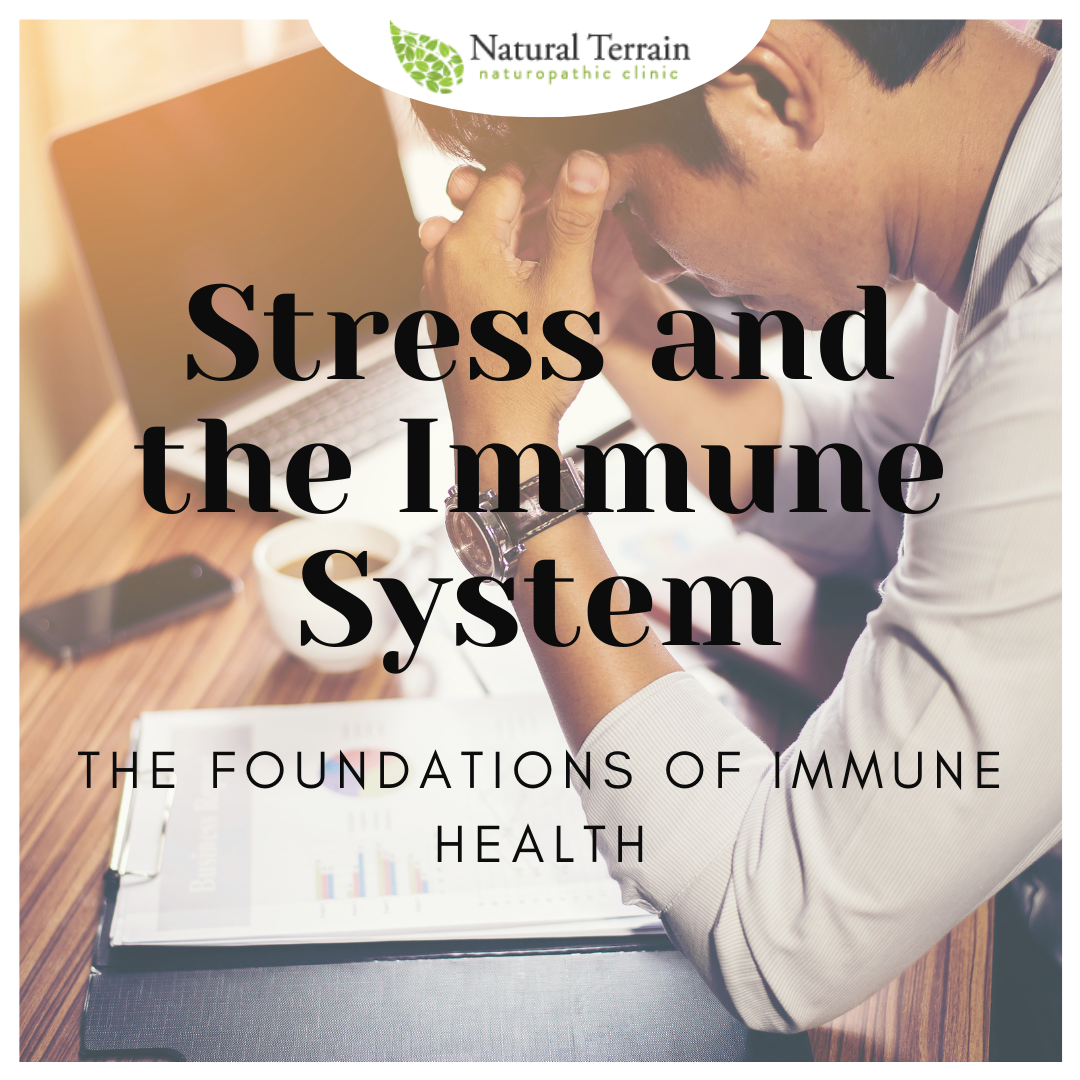 Our immune systems are changeable and adaptable. What we do, how we live and what we think plays a direct impact on our immune systems. Because of this, working on the foundational building blocks of the immune system is important in preventing illness.
Our immune systems are changeable and adaptable. What we do, how we live and what we think plays a direct impact on our immune systems. Because of this, working on the foundational building blocks of the immune system is important in preventing illness.
These foundations include….
- A good night’s sleep
- Stress management
- A healthy diet
- Exercise and time outdoors
- Appropriate supplementation.
In part 2 of our immune foundations series, we will be going over how stress affects the immune system and some tips for improving the immune system through stress management.
How stress affects the immune system
Psychoneuroimmunology is the study of how thoughts affect our bodies and physical health. It is a fascinating science that helps to show that health is really more than just the physical, it’s a combination of the physical, mental, emotional and spiritual aspects of our life.
The impact stress has on the immune system works through a couple of different mechanisms. First, nerves in the brain that sense stress goes directly to our lymphatic organs, including the bone marrow, thymus, lymph nodes and spleen which is where our immune cells are created and stored. Secondly, when we are stressed, our bodies release hormones and neurotransmitters (norepinephrine, epinephrine and cortisol). These substances can then attach to specific receptors on the immune cells, which reduce their ability to protect the body.
Additionally, stress can cause a change in behaviours, such as poor diet, changes in sleeping patterns, drinking alcohol, decreased exercise and smoking which can all lead to lower immune function. In order to optimize the immune system, it is important to identify your stressors and learn how to manage them.
Tips for Stress Reduction
Stressors are all around us. There are a lot of stressors in life that we can’t control but we can control how we cope with these stressors. Here are some tips on how to reduce your stress and manage the stress that you can’t control.
1. Eliminate unnecessary commitments
This is possibly one of the most important tips for stress reduction. We all need to learn how to say “no”. You only have so much time and energy, so make sure you are doing things you enjoy and that are within your current capacity. Having time to rest is a necessary commitment. Remember you don’t have to please everyone.
2. Reframe your thoughts
After you have eliminated unnecessary commitments, identify your stressors. Although we may not be able to eliminate these things from our lives, we can learn how to reframe our thoughts so what was once stressful is now just an opportunity for growth. You can learn about reframing your thoughts here.
3. Breathe
When you take deep breathes, you are activating the parasympathetic or relaxing part of the nervous system. It helps to lower your stress response. There are a number of different ways you can deep breathe. One of our favourites is belly breathing. To do this, place one hand on your abdomen and one on your heart. Try to keep the hand over your heart still, and only move the hand on your abdomen with each breath. As you breathe in, you should feel your abdomen expand and as you breathe out you should feel it go back in. Stopping what you are doing and taking 10 deep breathes once an hour is a great way to keep stress low.
4. Journaling
Set aside time every day to journal. This is your scheduled time to let go of what might be weighing you down. Write down everything you are thinking, the stresses you are feeling and the things that are on your mind. Getting it out on paper will help you to see your stressors and help to reduce the amount of space they occupy in your mind. For an extra stress management, end your journaling with writing down 3 things you are grateful for. Check out Dr. Bjorndal’s Journal: Moving Beyond – A journal into self-discovery – this is a great book to get you started!
5. Meditate
Meditation is a great way to bring your mind into the present moment and take a break from focusing on your stressors. There are a couple ways to meditate. You can find a guided meditation on YouTube, or meditate by focusing on your breath or mentally scanning your whole body. Make sure when you are meditating you are sitting in a comfortable position. Sitting on the ground with crossed legs or sitting on a chair with your back supported and feet flat on the ground are great options. Take the time to slow down your breathing and focus on you and your body in the current moment.
6. Schedule time for yourself and practice self-care
Doing things that you love and make you feel good are important for your health. Prioritizing you and your health will help to reduce stress to make you a better parent, spouse, child and/or employee.
To get help with stress management, or learning more about what you can do to keep your immune system healthy, book an appointment with one of our naturopathic doctors.
